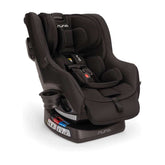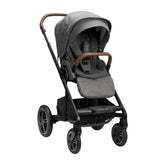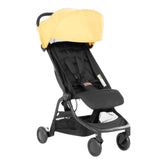Your First Poop After Baby: What You Need to Know About Postpartum Bowel Movements

You’ve just pushed out an entire baby and a placenta. Within the next few days, there’s one final item that will ultimately have to make a grand departure from your body: your first postpartum bowel movement. Having that first post-baby poop makes many people understandably anxious. If you experienced a vaginal birth, you may be worried about soreness or tearing in your perineal area. Those who delivered via C-section may be concerned that straining will be painful or tear their incision. Similarly, many people who’ve just given birth experience everything from diarrhea to constipation to incontinence to hemorrhoids after delivery. Let’s take a look at what to expect when it comes to pooping after childbirth and how to manage any potential issues.
Common Concerns About Pooping After Childbirth
Physically and emotionally, you’re healing from a significant event that’s caused numerous changes, to your muscles and ligaments, your internal structure, and your hormonal balance. Some of the most common pooping concerns after giving birth include:
- postpartum bowel movement pain
- postpartum constipation
- postpartum hemorrhoids
- postpartum diarrhea
- postpartum bowel incontinence
Each of these issues is normal and expected, though constipation is the most common. People who’ve undergone a C-section may not have a bowel movement for 3 or 4 days. Those who’ve had a vaginal birth may experience a bowel movement as soon as 1 to 2 days after delivery. Both situations are normal, but if you’re feeling worried, consult your healthcare provider so that they can offer treatment and advice.
Simple, portable, and perfectly designed with new moms in mind. The FridaBaby Fridet: The MomWasher is a peri bottle designed to make your post-delivery healing process cleaner and easier. It's way better than that hospital squirt bottle. A convenient tool both for home use and on the go, getting you back to baby faster. Lifetime warranty, no questions asked.

FridaBaby Fridet: The MomWasher
What Causes Changes to Postpartum Bowel Movements
Changes in your body, medical treatments, and anxiety can all play a role in how you experience postpartum bowel movements.
Changes in your body
A postpartum body experiences a number of transitions after childbirth that can impact bowel movements.
- Hormonal fluctuations
- Uterine contractions
- Pelvic floor changes
- Hemorrhoids (swollen, inflamed veins in the rectum and anus)
Medical treatments
Various types of medical treatments and procedures can also affect your ability to poop after childbirth.
- Drugs administered during and after delivery. Certain pain relievers can be constipating, while antibiotics may trigger a bout of diarrhea.
- Iron supplements. Iron supplements are frequently prescribed during pregnancy to prevent anemia and are well-known for their constipating effect.
- Limitations during labor. Many people aren’t allowed to have anything besides water during labor, making it difficult to produce an effective bowel movement.
- Perineal stitches. Whether your doctor performed an episiotomy or you had an unexpected tear during birth, you may have gotten stitches in your perineum. Many people worry about postpartum bowel movement pain and whether straining will burst the stitches (it likely will not).
Anxiety and overwhelm
There’s a lot going on down there after giving birth. Even urinating for the first time after having a baby can be scary and uncomfortable, particularly after a vaginal birth. Trying to poop while still in the hospital or while sharing a room with another patient can also feel intimidating.
In addition, caring for a newborn can be so overwhelming that many new parents forget to take care of themselves. Dehydration is common, especially among breastfeeding parents. Scarcity of sleep and not eating proper meals can also contribute to bowel movement issues. Many new parents simply avoid going to the bathroom when they feel the urge because they’ve got their hands full with the baby, further contributing to constipation.
Earth Mama Organics Organic Perineal Balm helps provide lasting, cooling comfort for pregnancy and postpartum places. And remember, your body will go back to normal — a new normal, but normal nonetheless. Promise.

Earth Mama Organics Organic Perineal Balm
Postpartum Constipation
Postpartum constipation can be miserable, but there are a number of strategies that can help you “go” more quickly and smoothly.
- Use a stool softener. Trouble pooping is so common after childbirth that stool softeners are almost universally sent home with people who’ve given birth as a “just-in-case” measure. They work by adding moisture to the stool to soften it and make it easier to pass. Stool softeners are typically considered safe to use while nursing.
- Hydrate. Nursing parents should be especially conscious of drinking enough water, around 80 to 100 ounces daily.
- Consume a healthy diet. Eat foods high in fiber, including fruits, vegetables, and whole grains.
- Take a walk. Light to moderate exercise can also get your system moving again. Try a short stroll around the block or wear your baby while dancing around the house.
- Begin eliminating constipating drugs. Under your healthcare provider’s guidance, try to wean off any constipating supplements or pain relievers. With iron supplements, for example, begin including more naturally iron-rich foods in your diet. For pain relief medications, inquire whether you can use acetaminophen or ibuprofen as an alternative.
- Try perineal massage. Research published in the Journal of General Internal Medicine showed that constipated adults who performed self-massage on the perineum for about a month noted a better quality of life and improved bowel function than a control group.
Postpartum Diarrhea
If postpartum diarrhea is an issue, consider limiting the amount of caffeine, artificial sweeteners, and (for some people) dairy you’re consuming. Avoid stool softeners as well. Consider following the BRAT diet (bananas, rice, applesauce, and toast) for at least 48 hours, and drink an electrolyte-rich beverage like coconut water to avoid dehydration.
You may also find it beneficial to begin Kegel exercises. Many people experience postpartum diarrhea because their rectal muscles were stretched or pulled. Healing your pelvic floor can help bring your bowel movements back to their usual consistency and frequency.
Postpartum Bowel Incontinence
Postpartum bowel incontinence, also known as fecal incontinence, usually clears up within a few months as your body recovers from pregnancy and childbirth and your muscles regain their strength. Postpartum bowel incontinence treatment typically includes over-the-counter anti-diarrhea medicine and practicing your Kegels. In rare cases, physical therapy or possibly even surgery may be necessary.
Postpartum Hemorrhoids
Straining and pooping can further irritate the swollen, inflamed veins around your anus and rectum. To get relief, consider using a sitz bath to help shrink the hemorrhoids. Chilled witch hazel pads can provide additional soothing. A donut pillow can help keep some of the pressure off your bottom. Also, be sure to take steps to prevent constipation so that you can avoid straining on the toilet.
Take care “down there” with herbal compresses filled with organic herbs traditionally used to soothe and comfort “down there” during pregnancy or after childbirth. The Earth Mama Organics Organic Herbal Sitz Bath is packed in easy-to-use, individual herbal sachets. The compresses can be cooled and gently “tucked” to help ease those pretty places or use the brewed infusion to make postpartum “padsicles” or use them as a sitz bath.

Earth Mama Organics Organic Herbal Sitz Bath
When to Call the Doctor About Pospartum Bowel Movements
Recovery is a slow road. Keep an eye on how things are progressing, and contact your doctor right away if you experience any of the following symptoms:
- Explosive postpartum diarrhea (very loose, unformed stool)
- No bowel movement for more than a week after giving birth
- More than five bowel movements daily
- Fever. A temperature of more than 100.4°F could be a sign of infection within the body or at the site of C-section incisions or perineal tears.
- Indications of a tear (fissure) in the lining of the anus. This may include blood in your stool, changes in stool color, and exceptionally painful bowel movements.
The Earth Mama Organics Herbal Perineal Spray is a soothing touch-free herbal mist for pregnancy and postpartum use, with a clever upside-down sprayer so it’s easier to reach hard-to-get places. With cucumber, witch hazel, and organic essential oils, it's safe for both before and after birth. Cruelty-free, no parabens, propellants, benzocaine, or artificial fragrance.

Earth Mama Organics Herbal Perineal Spray
The Bottom Line on Postpartum Bowel Movements
Though uncomfortable and nerve-wracking, postpartum bowel movement problems are exceedingly common. Contact your healthcare provider if you're worried or having trouble. Complications are less common, thankfully, so try not to stress too much. With a little patience and some simple home treatments, most postpartum bowel issues will resolve on their own.









